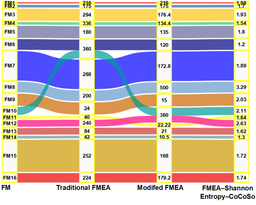Indonesia Climate Change Litigation
Published in Social Sciences and Law, Politics & International Studies
There are several aspects I would like to highlight in this study. First, the process of preparing this study was neither a short nor easy one. I had the idea to start excavating 2010-2020 climate related cases in late 2019, when (at that time) the Indonesian Supreme Court rejuvenated their online database for all cases in Indonesia. Collecting a decade worth of climate cases out of the thousand cases available in the database was not easy. The methodology needed to be precise so no climate cases would be left behind; as such, it took me 4 years to make sure all the data was collected and triangulated. Furthermore, we needed to make sure that all of the selected cases were robust until the research cut off date (August 2023). Several cases had gone from cassation case to review cases (in the Supreme Court), or from high court cases to cassation cases, etc. On top of that, I was working with one student research assistant at each period— if that student graduated, I needed to update the new student research assistant to maintain the method and make sure that the research was making steady progress.

The researcher in her office at Asia-Pacific Centre for Environmental Law, National University of Singapore (source: private collection, 2024)
The second factor involved the intricacies of this study. The methodology depended greatly on the definition I used for this study. I wanted this study to show that in Indonesia there are incidental climate change cases, and in these cases the issue of climate change was mentioned either in an indictment, a party’s argument, part of submitted evidence, part of an expert witnesses’ argument, judges’ considerations, or in the judgments. Therefore, I needed to add length to the ‘accepted’ climate change litigation definitions to one that also covers incidental climate change cases. Right after, I started to collect data based on my methodology. During this period, I had to move (bringing my family with me) to Singapore from Indonesia—at that time (February 2020), I thought that I would still be able to travel back and forth to collect data, meet with my research assistant, etc. But then, Covid hit, and all travel was halted. Since that time, we had to switch to online means to slowly continue the research.
 Judges in Rengat District Court, Riau Province, Indonesia
Judges in Rengat District Court, Riau Province, Indonesia
The findings: a dawn of new beginning for climate change litigation?
First, in the analyzed cases, climate change was presented as an impact rather than a primary argument. For example, in forestry cases, plaintiffs argued that deforestation could disrupt the microclimate and worsen global climate change. Second, court documents show a superficial understanding of climate change, treating it similar to floods or droughts, without fully grasping how these actions of forest and/or environmental degradation worsen climate change. Third, judges in these cases likely understood the environmental impacts especially from forest fires. Lastly, the cases often invoked human rights arguments, such as the loss of clean air and water for local communities.
Follow the Topic
-
Communications Earth & Environment

An open access journal from Nature Portfolio that publishes high-quality research, reviews and commentary in the Earth, environmental and planetary sciences.
Related Collections
With Collections, you can get published faster and increase your visibility.
Archaeology & Environment
Publishing Model: Hybrid
Deadline: Mar 31, 2026
Drought
Publishing Model: Hybrid
Deadline: Mar 31, 2026





Please sign in or register for FREE
If you are a registered user on Research Communities by Springer Nature, please sign in